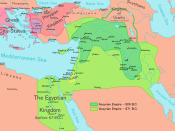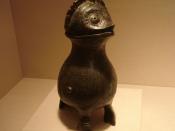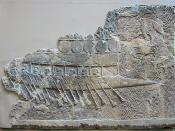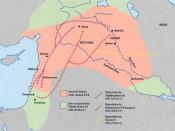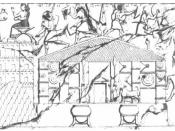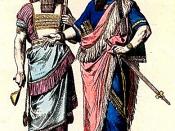Between 1000 B.C.E. and 500 B.C.E. in Western Eurasia, the rise of Israel, and the Neo-Assyrian and Persian empires had significant cultural, economic and political impact upon the region. The cultural, economical and the political aspects all had a very important impact upon the region. Although they all played an important part, the political aspect had the greatest impact. For it is the politics that ran the economy of each culture, it the politics which run the societies and make them what they are, or in this case what they were. Politicians had their fingers in everything, to everyday life, and even religion. For it are the politicians or the political aspects of each region in which makes there history, like wars, peace, heroes, religion, ECT⦠It is power that every social structure is after. It is the politics that cause war and fights all for the fight over the power to rule, and to own.
In the Mongol groups there were very strong hierarchies, but the leader was always forced to check their decisions with a council of the leaders of powerful families. Even with that the competition for resources reinforced slavery. Men and women that were captured during warfare or raids became slaves. The weaker groups secured protection from the stronger groups by providing them with slaves, livestock, weapons, silk, or cash. Many of the stronger groups found it easier to keep an on going war to make a living than it was to work themselves. It was the stronger groups that made the decisions for the people to tell them what was ok and what was not. They had the power so they ruled.
China, during the era of the Chou dynasty, consisted of a vast system of little kingdoms who acknowledged a loose allegiance to an emperor, called the 'Son of Heaven'. The Chinese believed that Heaven had granted rule over earth to a specially selected agent, who was responsible for good harvests and all other terrestrial phenomena that might affect human activity. Behavior constituted the essence of imperial duty.
When the Chou usurped the throne form the Shang dynasty, China itself was split into several states. The Shang, in fact, only had power over a relatively small region in the Yellow River area. The Chou occupied an area to the west of the Shang kingdom, but when the Chou kings overthrew the Shang, the Chou kingdom became incredibly large.
The Chou seems to have adopted Shang life and Shang government, so that there was really littler difference between the two dynasties. AS under the Shang, government was largely in the hands of city-states; since the territory greatly expanded after the Chou invasion. The Chou adopted the agriculture of the Shang as well as Shang writing.
The Chou governed somewhat differently. Although the basic political unit was the city-state, the Chou appointed their own kinsmen, or the kinsmen of their most trusted allies, to rule over the various city-states. The Chou had learned form their own successful usurpation of Shang power: much of the Chou success was due primarily to their winning-over of disaffected city-states against the Shang.
In the rise of Israel it was not just politics that ran the region but it was religion as well. It was the religion that had the power which in a way the religion was the political power of the region because it was the religious aspects that ran the people that lived there. It is the religion that has every body at war against each other in Israel and Jerusalem. It is the politics of religion that had every one in each region in disagreement.
David in 1035-972 B.C.E. was the Second king of Israel and the successor of Saul. He united Judah and Israel, formerly a tribal confederacy, and he made Jerusalem his capital. In Jewish tradition David became the symbol of the ideal king, and among Christians he is the ancestor of Jesus. His son, Absalom, rebelled against him and was killed. After David's death, his son Solomon became king, and founded a famous line of kings.
Elijah in 927-850 B.C.E. saved the Yahweh religion form corruption by nature worship of Baal. During the time of King Ahab, Phoenician deitis were introduced and worshipped in Israel. The prophet Elijah became the leader of the Jehovic countermovement. He denounced the courtly corruption and attacked the Baal cult. Elijah proclaimed that there was no reality except the God of Israel. He also taught the idea of salvation being bestowed on the purified true believers.
Elisha in 882-798 B.C.E. succeeded Elijah in the struggle to maintain the worship of Yaweh in the face of the invading cult of the Phoenician god Baal. Jehu was anointed as kin of Israel by a delegate of Elisha. The prophet called upon the king to do away with the Baal cult.
As the Assyrian empire in 777-692 B.C.E. threatened the existence of Israel the prophet Isaiah proclaimed that the threat was a warning form God to a godless people. Isaiah urged the kings of Judah to pursue justice and avoid dangerous alliances, trust in God's protection instead, Isaiah held that if it is God who decides the destiny of nations, security is for God to grant and for men to deserve. Isaiah promised that a messiah would eventually appear to offer salvation.
The chief force for change was the rise of the powerful and aggressive Neo-Assyrian Empire, and they were the first to rule over extensive lands and diverse people. Politics are and were driven by pride, greed and religious convictions, and this to be what drove the Assyrians to defeat all of the rival great kingdoms.
The Assyrian Empire, the main people were segregated in to three classes that had existed in Hammurabi's Babylon a millennium before. The first group were the free, landowning citizens. The second group were the farmers and artisans attached to the estates of the king or other rich landholders. And the third groups were the slaves, slaves drawn from debtors who had failed to make good and form prisoners of war.
With the diversity of all of the cultures mixing and intermingling, politics took control over the cultures, economic and even the religion all over. Each group had a taste of power and once they had they wanted more and more until they were no more, or until some other group took over because they were just as greedy. I found that the people ruling the politics were greedy for power and control. Once they had the control they wanted more and would not let there pride be hurt by saying that they had enough because to them it was never enough. And religion the ultimate tool of politics, they used they fear of God or gods to get the people to do what they wanted. They also used religion to in their benefit by twisting it to say that they were the divine straight from God or gods to do their work, which gave politics the free reign to do as they pleased. I truly believe that it is politics of greed, pride and religious conviction that made the greatest impact on all of the regions, actually on all of history all over the world.
